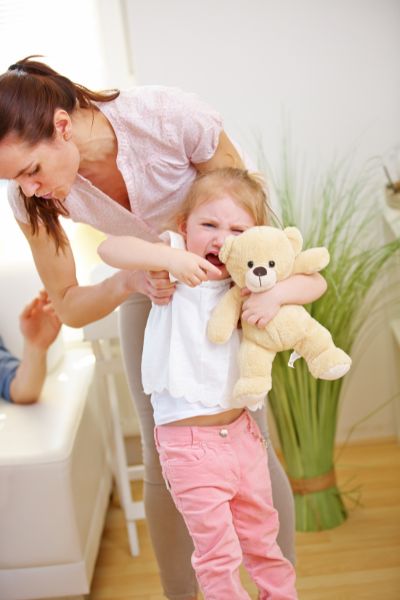How to Deal with your child Attitudes
Do you ever feel like you’re at your wits’ end when it comes to your child’s attitudes? When a child has an attitude, It can be incredibly frustrating when kids are disrespectful and uncooperative.
Did you know that child attitudes can be contagious? Like adults, children can “catch” positive or negative attitudes from those around them.
A child exposed to negativity will likely adopt a negative attitude themselves, while a child surrounded by positivity will often develop positive attitudes.
This blog post will discuss the different types of child attitudes, why they happen, and how to deal with them.
We will also provide some helpful tips on how to help teach your child good behavior and attitude. Let’s get started!

Different types of child attitudes.
Some common ones include:
- Disrespectful or uncooperative behavior
- Defiance
- Argumentative behavior
- Stubbornness
- Indifferent
- Jealousy
- Dishonest
These attitudes can be exhibited in different ways and at different times.
For example, a child might be disrespectful when they refuse to listen to their parents or teachers.
Or, they may be uncooperative when refusing to do what they are told.
So, why do kids have bad attitudes?
There are a few reasons:
- The child may be going through a tough time in their life, and they don’t know how to express themselves
- They could be copying the behavior of someone they look up to
- The child be feeling overwhelmed or stressed
- The child could be experiencing some sort of trauma
- They might fear judgment
- The child thinks that showing emotion is a sign of weakness
- They are very sensitive
- The Child is HALT; hungry, angry, lonely, or tired
- They are suffering from depression
Now that we understand some of the reasons behind child attitudes let’s talk about how to deal with them.
As we mentioned, trying and understanding the child’s perspective is essential.
How do children learn their attitudes?
Most attitudes are learned from observing the people around them, such as their parents, guardians, or older siblings.
So, if a child sees their parent being disrespectful, they are more likely to behave similarly.
It is also important to keep in mind that child attitudes can be influenced by outside factors, such as what they see on television or social media.
Attitudes in different ages and how to deal with them.

Types of parental attitudes?
Four types of parental attitudes that can influence child behavior:
- Authoritarian
- Permissive
- Uninvolved
- Authoritative
How do Authoritarian parents affect their child’s attitude?
Authoritarian parents are very strict and have high expectations for their children.
They often use punishment as a way to discipline their child.
As a result, children raised by authoritarian parents may have a negative attitude towards authority figures.
How do Permissive parents affect their child’s attitude?
Permissive parents are the opposite of authoritarian parents. They are very lenient and rarely use discipline.
As a result, children raised by permissive parents may have difficulty following rules and instructions.
And may have attitudes like entitlement or narcissism.
The Permissive parent is more prone to saying things like, “Don’t you know how good you are? You are better than anyone else.”
Which helps the child to develop an entitlement attitude.
How do Uninvolved parents affect their child’s attitude?
Uninvolved parents are generally uninterested in their child’s life. They often don’t set rules or provide guidance. They are often unavailable.
As a result, children raised by uninvolved parents may have difficulty forming attachments, be more likely to act out, and have a negative attitude towards authority figures.
They may have difficulty following rules and instructions and may even have the feeling that they are unworthy of love.
How do Authoritative parents affect their child’s attitude?
The authoritative parent is more likely to be firm but fair. They provide structure and expectations but also allow for some flexibility.
And they encourage open communication between parent and child.
One of the most important things you can do as a parent is to be consistent with your child. Inconsistency can lead to confusion and chaos.
Authoritative parents are a balance between authoritarian and permissive parenting. They have high expectations for their child, but they also provide support and guidance.
As a result, children raised by authoritative parents are more likely to be independent and successful.
An authoritative parent says, “I know you can do it. Let me know if I can help.”
Which helps the child to develop a sense of self-efficacy.
Attitudes in different ages and how to deal with them
Child attitudes can change as they age. Therefore, it is important to be aware of the different types of attitudes children may have at different developmental stages.
Infants (0-12 months) – babies are primarily concerned with meeting their basic needs at this stage. They may have moments of happiness or sadness, but they generally don’t have strong emotions.
Their emotions at this stage are reliant on whether they are hungry, tired, or in need of connection.
Toddlers (12-36 months) – at this stage, toddlers are becoming more aware of their surroundings and may begin to express more negative emotions like anger and frustration. In addition, at this stage, a child is more curious about the world, and their curiosity can be seen as defiant or disobedient as they have no cause and effect understanding.
Preschoolers (3-6 years) – at this stage, preschoolers are becoming more independent and may start to assert their independence through testing boundaries.
They may also start to experience more intense emotions like jealousy or fear. which can result in tantrums and frustration
School-aged children (6- 12 years) – at this stage, school-aged children are developing their own identities.
At this age, they are starting to transition into adulthood and thus may want a bigger deal of freedom and rebel against authority figures.
They may also start to experience more complex emotions like guilt and shame.
They may also start to experience more negative emotions like anxiety and depression.
Teenagers (12-18 years) – at this stage, teenagers are going through many changes, just like school-aged children. Add hormones to this stage, and your child will be confused, frustrated, and emotional.
It is usual for teenagers to rebel against authority and want more freedom.
They may also start to experiment with risky behaviors.
Parents need to be supportive and understanding during this stage.
It is important to remember that child attitudes can change based on the situation. For example, a typically happy and cheerful child may act out if they are tired or hungry.
It is also essential to keep in mind that child attitudes are often a reflection of the adults around them. Therefore, if you want your child to have positive attitudes, it is important to model them yourself.
A typical Dinner table scenario
The child is sitting at the dinner table, picking at their food. They have been quiet all evening and seem in a bad mood. The parents try to engage them in conversation, but the child just grunts in response.
The father gets frustrated and yells at the child, telling them to stop being disrespectful. But unfortunately, the child’s mood doesn’t improve, and they continue to pick at their food until they are finally excused from the table.
The mother gives the father a look of disapproval and follows the child into the living room, where she tries to talk to them about what’s wrong. The child shrugs their shoulders and says they don’t know. They just don’t feel like talking.
The mother tries to reassure the child that they are loved and important, but the child just turns away and goes to their room.
The father could have been more understanding and tried to listen to what the child was trying to say. For example, he could have explained that it’s not okay to be disrespectful at the dinner table, but he didn’t need to yell at the child.
The father could have said something like, “I know you’re having a tough day, but we still need to respect each other at the dinner table. Let me know if you need to talk about what’s going on.”
The mother could have been more supportive and tried to get the child to open up about what was wrong. She could have also been more consistent with her expectations.
In this scenario, the child is acting out because they are either experiencing negative emotions or trying to get their parents’ attention.
The child may be acting out because they feel neglected or unsupported. Parents need to try to understand what is causing their child’s behavior to address the issue.
If you’re unsure why your child is acting out, try talking to them and see if they can tell you what’s wrong. If they don’t want to talk, that’s okay; just let them know that you’re there for them when they’re ready.
Disrespectful behavior should not be tolerated, but it’s important to try to understand why it’s happening so that you can constructively address the issue.
Help your child know a better way to communicate their frustration. Teach them to say something like, “I’m feeling really angry right now. I need some time alone.”, “I hope you understand why I’m feeling this way.”, or “Can we talk about this when I’m not so upset?”

8 Important attitudes to help your child develop
- Respectful communication
- Assertiveness
- Emotional awareness
- Having a sense of community
- Empathy and understanding of others
- Inhibition
- Being responsible
- Gratefulness and self Love
1) Respectful communication
It’s important to help your child develop healthy coping mechanisms for negative emotions. In addition, teaching them how to express their feelings respectfully will help them in all areas of their life.
One way to help them develop this skill is by modeling respectful communication.
When communicating with your child, try using “I” statements. For example, instead of saying, “you’re being really disrespectful right now,” try saying, “I feel disrespected when you talk to me like that.”
Another way to help your child develop respectful communication is by teaching them active listening skills.
This involves listening to what the other person is saying and responding in a way that shows you understand their feelings.
For example, if your child says they’re angry, you can say something like, “I can see that you’re feeling really angry right now. I’m here for you, and I want to help.”
2) Assertiveness
Part of having a healthy attitude is being able to assert oneself in different situations. This doesn’t mean that your child should be aggressive, but they should be able to stand up for themselves and their beliefs.
Assertiveness is a healthy way to communicate and can help prevent your child from being taken advantage of by others.
It’s also an important skill for them to learn to healthily resolve conflicts.
There are several ways you can help your child develop assertiveness. One way is to encourage them to stand up for themselves when they’re being mistreated.
Finally, it’s also important to model assertive behavior for your child. If you can communicate effectively and respectfully, they’ll be more likely to learn how to do it themselves.
3) Emotional awareness
Helping your child to understand and label their emotions will allow them to cope with them healthily. It’s also important to teach them how their emotions can affect others.
Encourage your child to express their feelings constructively. It’s important for kids to feel like they can express themselves without judgment.
If they feel like they can’t talk to you about their problems, they may bottle up their negative emotions, which can lead to explosive outbursts.
One way to help your child develop emotional awareness is by teaching them to identify their emotions. You can do this by talking about how they’re feeling and why they might be feeling that way.
Another way to help them develop emotional awareness is by teaching them how to cope with their emotions in a healthy way. This can include talking to a trusted adult, taking a break from the situation, or listening to calm music.
Finally, it’s also important to model emotional awareness for your child. If you can identify and healthily cope with your emotions, they’ll be more likely to learn how to do it themselves.
4) Having a sense of community
It’s important for children to feel like they are part of a community. This can help them to develop a sense of belonging and purpose. It can also help them to form positive relationships with others.
You can help your child develop a sense of community in several ways. One way is to get them involved in extracurricular activities, such as sports or clubs. This will help them meet other children with similar interests and form positive relationships.
Volunteering together is another way to help them develop a sense of community. This can be done through local organizations or even by helping a neighbor in need. This will help them understand the importance of giving back and helping others.
Finally, it’s also important to model a sense of community for your child. If you can show them that you care about your community and its members, they’ll be more likely to learn how to do it themselves.
5) Empathy and understanding of others
Children need to learn empathy so that they can understand and relate to the experiences of others. This is an important skill for them in all areas of their life.
Help them understand that everyone makes mistakes. It’s okay to make a mistake, but it’s important to learn from it and try not to do it again.
Also, let them know that just because someone makes a mistake doesn’t mean they’re bad. We all make mistakes, and we all have different experiences that shape our lives.
Help your child understand that everyone is different, which makes us unique.
Encourage your child to be accepting of others, even if they are different from them. For example, it’s okay to be curious about someone different, but respecting their differences is important.
We are all human beings and deserve to be treated with respect. Help your child develop a sense of empathy so that they can understand
6) Inhibition
Inhibition is the ability to control one’s impulses, and it’s one of the important executive functioning skills every child needs. This is an important skill for children to develop to make good decisions and resist negative peer pressure.
There are several ways you can help your child develop inhibition. One way is to provide them with opportunities to practice self-control. For example, you can give them a choice between two activities and see if they can resist the temptation to do the one they want to do right away.
Another way to help them develop this skill is by teaching them how to take breaks when feeling overwhelmed or frustrated. This will help them avoid making impulsive decisions they might regret later.
Finally, it’s also important to model self-control for your child. If you can control your impulses, they’ll be more likely to learn how to do it themselves.
7) Being responsible
Children need to learn responsibility. This includes taking care of themselves and their belongings, doing their chores and homework, and being accountable for their actions.
There are several ways you can help your child develop responsibility. One way is to give them age-appropriate chores and tasks to do around the house. This will help them learn how to take care of themselves and their belongings.
Another way to help them develop responsibility is by holding them accountable for their actions. For example, if they do something wrong, talk to them about it and help them understand why it was wrong. Then, help them come up with a solution to avoid making the same mistake in the future.
Finally, it’s also important to model responsible behavior for your child. If you can take care of yourself and your belongings and be accountable for your actions, they’ll be more likely to learn how to do it themselves.
8) Gratefulness and self Love
Last but not least, teaching your child to be grateful and love themselves is crucial. This includes appreciating what they have, being thankful for the good things in their life, and accepting themselves for who they are.
There are several ways you can help your child develop gratefulness and self-love. One way is to help them appreciate what they have. For example, you can talk to them about the things they have that other children might not have.
Another way to help them develop gratefulness is by teaching them how to be thankful for the good things in their life. For example, you can have them write down one thing they’re grateful for daily.
Finally, it’s also important to help your child accept themselves for who they are. This includes teaching them to love their bodies, be proud of their accomplishments, and not compare themselves to others.
Model self-love by accepting yourself for who you are. This will help your child to understand that it’s okay to be imperfect and that they don’t have to be perfect to be loved.
How do you help teach your child good behavior and attitude?
Lead by Example
One of the best things you can do is to lead by example. Show your child how you want them to behave. Model the behavior and attitudes you want to see in your child.
Be consistent
It’s essential to be consistent with your child. If you expect certain behaviors from them, you need to be consistent in your expectations. You need to follow through with consequences if they don’t meet your expectations.
Encourage positive behavior
When your child does something good, praise them for it. This will encourage them to continue behaving positively.
Be patient
Dealing with negative attitudes can be frustrating, but it’s important to be patient with your child. They are still learning and growing, and it takes time for children to develop healthy coping mechanisms for their emotions.
Understand their strength
All children are different and will have different strengths and weaknesses. It’s important to understand your child’s strengths and weaknesses so that you can help them develop in all areas.
If you’re not sure what your child’s strengths and weaknesses are, there are a few ways to find out. One way is to talk to their teachers or other adults who spend time with them. Another way is to observe them yourself and take note of the things they’re good at and the things they struggle with.
When you are mindful of your child’s strengths you can emphasize those strengths to your child and help them use them to gain self-awareness and self-confidence. You can help them be mindful of their strength and use them accordingly.
How to react when your child is disrespectful?
Don’t punish
Punishment is a control tactic that doesn’t work in the long run. So it’s important to find other ways to encourage your child to display positive behavior.
If you’re dealing with a child with a negative attitude, try understanding where they’re coming from.
It’s important to find out what’s causing the child’s negative attitude before you can help them change it.
Remain Calm
It can be challenging to remain calm when your child behaves disrespectfully, but it’s important to try. Losing your temper will only make the situation worse. learn how to better manage your emotions when you are upset.
Remember that they are acting out of frustration and anger.
Try to calmly talk to your child about why their behavior is inappropriate and how they can better handle their emotions. Once they have calmed down, you can discuss the situation further and devise a plan to prevent it from happening again.
Try to see things from their perspective.
If you can understand why your child is acting out, it will be easier to find a way to help them.
It’s important to remember that children are still learning and growing. They don’t have the same life experience or coping skills as adults.
Focus on the behavior, not the child
When addressing negative behavior, it’s essential to focus on the behavior and not on the child. This will help your child feel like they are not being attacked.
Be firm but understanding, and try to help your child find a better way to handle their emotions next time they feel frustrated or angry. Thanks for reading! I hope this was helpful. If you have any questions or comments, please feel free to leave them below. Until next time!
To sum things up
Remember these tips when dealing with a child’s negative attitude: lead by example, be consistent, encourage positive behavior, be patient, and remain calm. And if you want to go further about the topic, check out this book on Amazon.
If you found this blog post helpful and want more parenting advice, please follow me on Instagram. I share weekly tips and tricks for handling child behavior and attitude problems. Thanks for reading!







